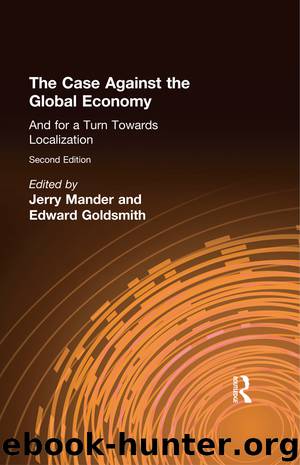The Case Against the Global Economy by Mander Jerry

Author:Mander, Jerry
Language: eng
Format: epub
Publisher: Taylor and Francis
VIOLENCE
Interestingly, a number of Ladakhis have linked the rise in birth rates to the advent of modern democracy. ‘Power is a question of votes’ is a current slogan, meaning that in the modern sector, the larger your group, the greater your access to power. Competition for jobs and political representation within the new centralized structures is increasingly dividing Ladakhis. Ethnic and religious differences have taken on a political dimension, causing bitterness and envy on a scale hitherto unknown.
This new rivalry is one of the most painful divisions that I have seen in Ladakh. Ironically, it has grown in proportion to the decline of traditional religious devotion. When I first arrived, I was struck by the mutual respect and cooperation between Buddhists and Muslims. But within the last few years, growing competition has actually culminated in violence. Earlier there had been individual cases of friction, but the first time I noticed any signs of group tension was in 1986, when I heard Ladakhi friends starting to define people according to whether they were Buddhist or Muslim. In the following years, there were signs here and there that all was not well, but no one was prepared for what happened in the summer of 1989, when fighting suddenly broke out between the two groups. There were major disturbances in Leh bazaar, four people were shot dead by police, and much of Ladakh was placed under curfew.
Since then, open confrontation has died down, but mistrust and prejudice on both sides continue to mar relations. For a people unaccustomed to violence and discord, this has been a traumatic experience. One Muslim woman could have been speaking for all Ladakhis when she tearfully told me, ‘These events have torn my family apart. Some of them are Buddhists, some are Muslims, and now they are not even speaking to each other.’
The immediate cause of the disturbances was the growing perception among the Buddhists that the Muslim-dominated state government was discriminating against them in favour of the local Muslim population. The Muslims for their part were becoming anxious that as a minority group they had to defend their interests in the face of political assertiveness by the Buddhist majority.
However, the underlying reasons for the violence are much more far-reaching. What is happening in Ladakh is not an isolated phenomenon. The tensions between the Muslims of Kashmir and the Hindu-dominated central government in Delhi, between the Hindus and the Buddhist government in Bhutan, and between the Buddhists and the Hindu government in Nepal, along with countless similar disturbances around the world, are, I believe, all connected to the same underlying cause: the intensely centralizing force of the present global development model is pulling diverse peoples from rural areas into large urban centres and placing power and decision-making in the hands of a few. In these centres, job opportunities are scarce, community ties are broken and competition increases dramatically. In particular, young men who have been educated for jobs in the modern sector find themselves engaged in a competitive struggle for survival.
Download
This site does not store any files on its server. We only index and link to content provided by other sites. Please contact the content providers to delete copyright contents if any and email us, we'll remove relevant links or contents immediately.
| Accounting | Economics |
| Exports & Imports | Foreign Exchange |
| Global Marketing | Globalization |
| Islamic Banking & Finance |
The Meaning of the Library by unknow(2573)
Six Billion Shoppers by Porter Erisman(2305)
Why Nations Fail: The Origins of Power, Prosperity, and Poverty by Daron Acemoglu & James Robinson(2299)
No Time to Say Goodbye(2119)
Red Notice by Bill Browder(2082)
Currency Trading For Dummies by Brian Dolan(1929)
The Economist [T6, 22 Thg9 2017] by The Economist(1927)
Thank You for Being Late by Thomas L. Friedman(1772)
Bitcoin: The Ultimate Guide to the World of Bitcoin, Bitcoin Mining, Bitcoin Investing, Blockchain Technology, Cryptocurrency (2nd Edition) by Ikuya Takashima(1699)
Amazon FBA: Amazon FBA Blackbook: Everything You Need To Know to Start Your Amazon Business Empire (Amazon Empire, FBA Mastery) by John Fisher(1576)
Coffee: From Bean to Barista by Robert W. Thurston(1549)
The Future Is Asian by Parag Khanna(1484)
The Great Economists by Linda Yueh(1457)
How Money Got Free: Bitcoin and the Fight for the Future of Finance by Brian Patrick Eha(1425)
Grave New World by Stephen D. King(1422)
Pocket World in Figures 2018 by The Economist(1422)
Capitalism Without Capital: The Rise of the Intangible Economy by Jonathan Haskel(1402)
The Sex Business by Economist(1386)
Cultural Intelligence by David C. Thomas(1290)
